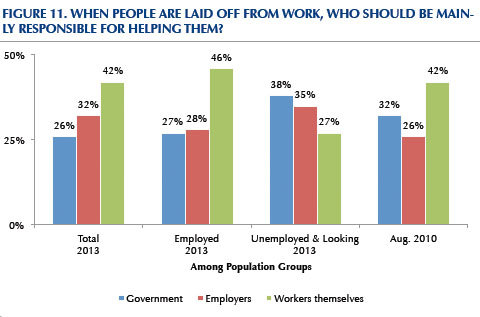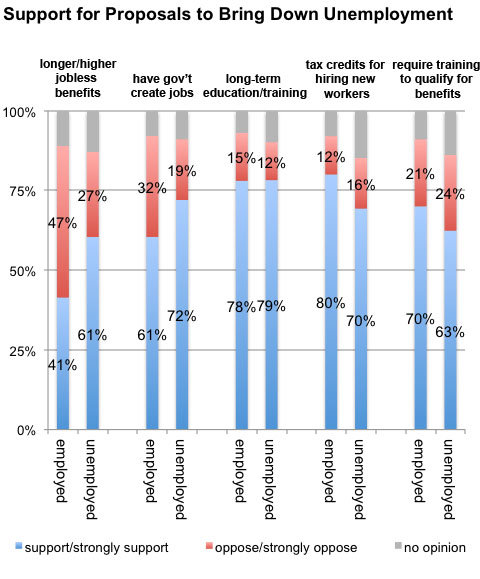
CATHERINE RAMPELL
Dollars to doughnuts.
The last election cycle brought a lot of talk about “makers versus takers” in America: a dichotomy featuring entrepreneurial, taxpaying, self-reliant Americans who work hard and keep the economy going, as opposed to those who mooch off the government.
As I reported in an article in Thursday’s paper, though, a new survey suggests that even those who might have the greatest cravings for government cheese still subscribe to more of a bootstrap mentality.
The survey was conducted in January by the Heldrich Center for Workforce Development at Rutgers University.
Asked about who should be “mainly responsible” for helping people who are laid off from work, just a quarter of people said the government. Another 42 percent said workers themselves, and 32 percent named employers. (And as you can see in the chart below, Americans are less likely to say that the government is mainly responsible for the displaced today than they were when asked in August 2010.)
 Heldrich Center for Workforce Development, Rutgers University Survey was conducted among 1,090 American workers Jan. 9-16, 2013. The margin of error is plus or minus 3 percentage points.
Heldrich Center for Workforce Development, Rutgers University Survey was conducted among 1,090 American workers Jan. 9-16, 2013. The margin of error is plus or minus 3 percentage points.
In January, unemployed workers were more likely than the employed to say that the government was mainly responsible for helping the laid off — 38 percent versus 27 percent — but that still leaves only a minority of the unemployed saying they are chiefly the government’s responsibility.
That said, when it comes to supporting specific government policies that would help the unemployed, a majority of all respondents supported almost every idea the researchers asked about.
The one exception was on longer and higher unemployment benefits: Just shy of half of Americans support this. But the unemployed — those who would presumably benefit from such a policy — supported this idea by a wide margin, with 6 in 10 saying that benefits should be more generous.
 Survey was conducted among 1,090 American workers Jan. 9-16, 2013. The margin of error is plus or minus 3 percentage points. Source: Heldrich Center for Workforce Development, Rutgers University.
Survey was conducted among 1,090 American workers Jan. 9-16, 2013. The margin of error is plus or minus 3 percentage points. Source: Heldrich Center for Workforce Development, Rutgers University.
In the chart above, the blue bars show support for various proposals. Unemployed workers were also more likely than the employed to support having the government create jobs for unemployed workers. Employed workers liked this idea a lot, too, though.
The two groups were equally likely to support providing long-term education and training programs that help people change careers.
On two proposals, the employed were more supportive than the unemployed: requiring people to enter training programs in order to receive unemployment insurance, and giving tax credits to businesses that hire workers. Again, a majority of both groups favored these ideas.
One caveat to keep in mind when thinking about these maker-versus-taker issues is that a lot of Americans don’t realize they’re relying on the social safety net when they actually are.
Article source: http://economix.blogs.nytimes.com/2013/02/07/makers-vs-takers-an-update/?partner=rss&emc=rss